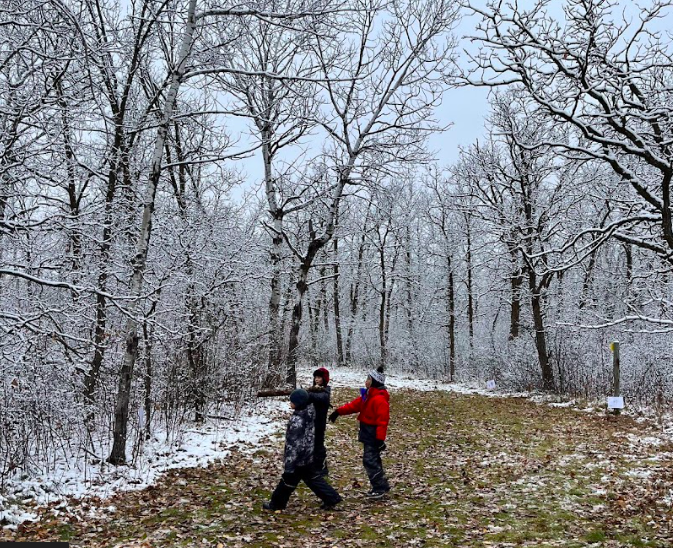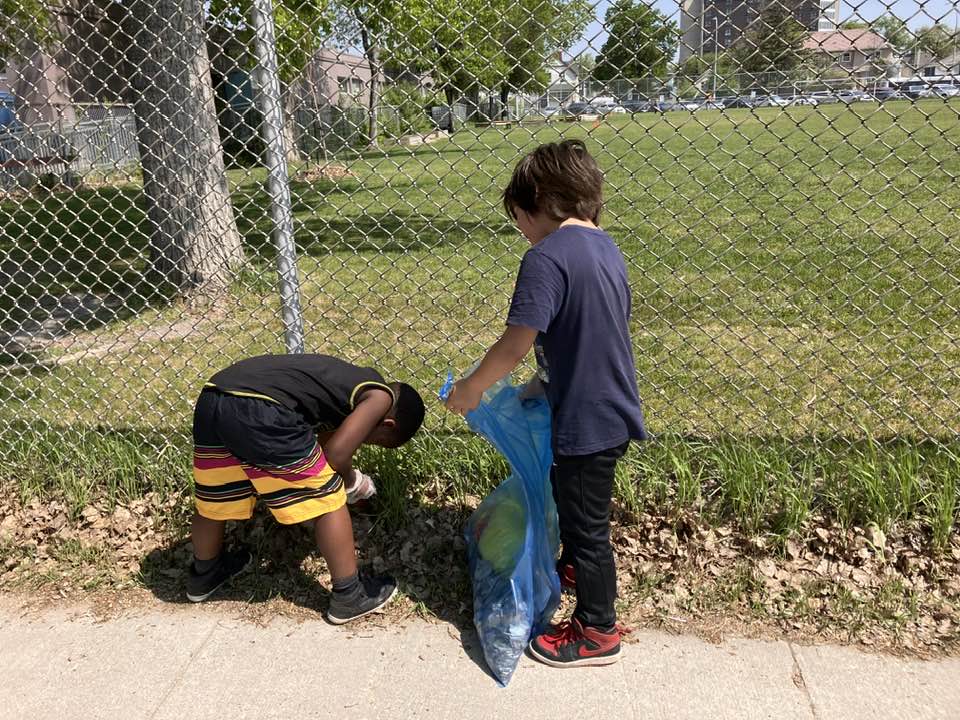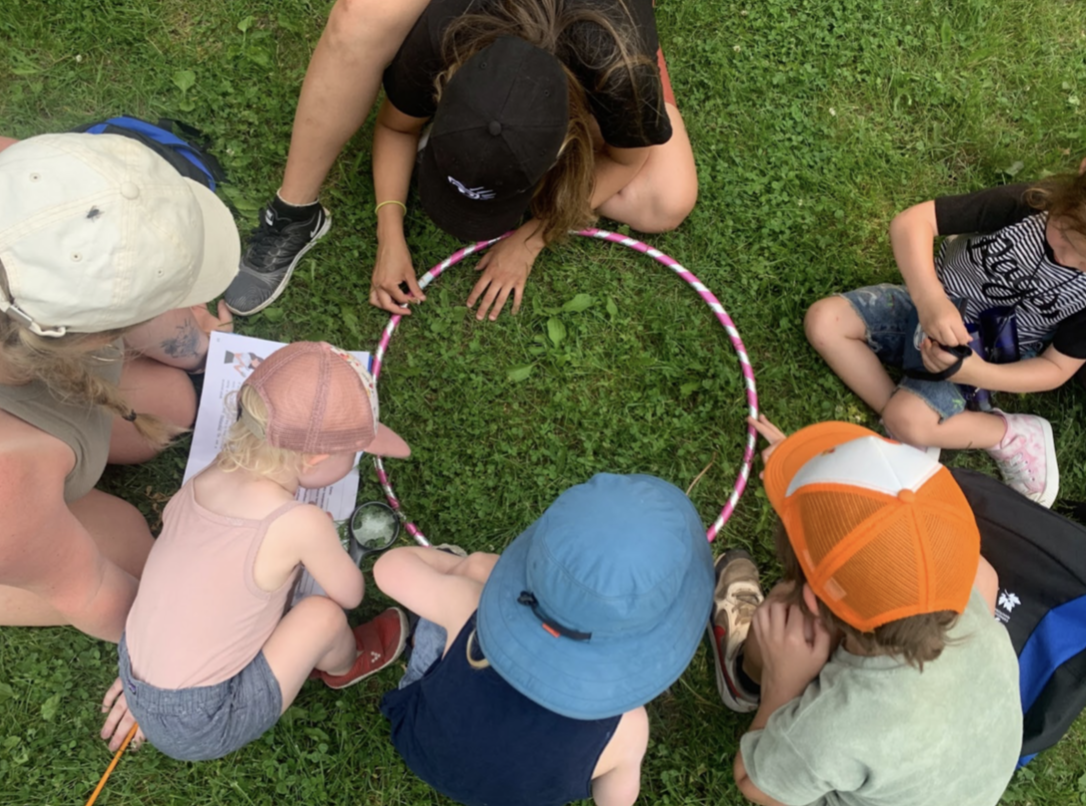“Reconnection to the natural world is fundamental to human health, well-being, spirit, and survival.” ― Richard Louv
Welcome to the CPAWS Manitoba Outdoor Education Program
The CPAWS Manitoba Outdoor Education Program gets kids (and adults!) outside and teaches them to appreciate the wonders of nature through games, activities and community building.
It aligns with our mission to connect people to nature by teaching Manitobans about the value and beauty of our province and its wildlife.
Outdoor education is fundamental to establishing a long-lasting connection to nature. Researchers, educators and parents alike agree that when people of any age spend time outdoors, there are immense physical, mental, social, and environmental benefits.
This flexible program was designed to be delivered by educators, by parents or by CPAWS staff and volunteers in order to accommodate pandemic-related restrictions on social gatherings. It evolved into a program that continues to serve communities across Manitoba.
A further 983 Manitobans benefitted from 44 Nature Club classes & adult-oriented workshops while 12,003 people registered for 57 nature-themed webinars.
Program Goals
- Support efforts to shift learning outdoors through school outings, interpretive programming, webinars and an online community.
- Expand knowledge of Manitoba's wildlife, natural environment and key topics in conservation by developing lesson plans tied to the Manitoba curriculum and a speaker series aimed at the general public.
- Increase access to outdoor learning by providing educators, parents and the general public with accessible, free resources.
What We Do
- Deliver place-based outdoor education workshops and guided field trips for schools, daycares, summer camps and community groups like the Girl Guides.
- Deliver an after-school program in Winnipeg-area schools.
- Host nature-based programming for families and the general public.
- Engage children in outdoor education through activity tables set up at festivals and venues like the zoo.
- Host a popular speaker series on a variety of nature-related topics.
- Provide a hub of resources for educators and families.
How to Use This Learning Hub
In this online portal, you’ll find both outdoor education and boreal forest resources. This includes reading materials, videos, applied science and technology, lesson plans, student takeaways, and more.
Check out our event listings for drop-in classes at Crescent Drive Park, free webinars and other outdoor learning opportunities.
Book a workshop or field trip for your school, daycare, summer camp or community group.
Subscribe to our outdoor education newsletter to get first dibs on booking our often sold-out programs.
Be sure to subscribe to our events newsletter and follow us on Facebook, Instagram, and Twitter so you don’t miss out on upcoming events.
You can register on Eventbrite and catch up on past webinars on Vimeo.
CPAWS Outdoor Education
Learn With Us
Learn More
Learn More
Learn More
Learn More
Learn More
Learn More
Learn More
Learn More
Learn More
Related Articles

How Does Spending Time in Nature Improve Our Physical Health and Mental Well-Being?

Tackling Trash: Highlights from CPAWS’ 2023 Student Litter Cleanup Challenge

Discover Nature With a CPAWS and Watersheds Backpack
Filling an Urgent Need for Outdoor Education
The CPAWS Manitoba Outdoor Education Program was developed in response to the COVID-19 pandemic, which created an urgent need to support educators and parents seeking safe ways to engage children and youth.
Teachers told us they were struggling to find ways to adapt to the new reality and needed support delivering programming. Parents said they were looking for new ways to engage their children outside. Manitobans of all ages were suffering from the isolation of social distancing and were seeking ways to connect to people safely outdoors.
We expanded our efforts to connect Manitoba to nature by launching the Outdoor Education Program in August 2020.
The purpose of the program is to connect people to nature by teaching Manitobans about the value and beauty of our province and its wildlife.
Spending time outdoors gives children improved cognitive function, better mental health and enhance socio-emotional learning, according to an extensive research digest by the Children’s Nature Network.
Yet far too many children don’t have regular access to nature.
Instead, an epidemic of excessive screen time is harming youth still struggling to recover from the emotional, economic and health impacts of the COVID-19 pandemic.
Here are troubling stats from Statistics Canada, which found that youth were spending more time on screens and less time being physically active even after the distribution of vaccines eased pandemic restrictions.
- Prior to the pandemic, just 41% of Canadian youth aged 12-17 spent less than two hours a day on screens on school days while only 21% spent more than four hours on screens. The rest fell somewhere between.
- By 2021, only 27% were spending less than two hours a day on screens while 34% spent more than four hours on screens on school days.
- Prior to the pandemic, 60% of boys and 47% of girls age 12-17 were getting at least an hour of physical activity each day.
- By the sumer of 2021, boys had mostly recovered from a pandemic slump with 57% getting an hour of exercise a day.
- There was no post-vaccine recovery among girls: just 35% were getting the recommended hour a day of exercise in the summer of 2021.
Children aged 5-11 fared far worse.
- Prior to the pandemic, 76% of Canadian children aged 5-11 met the screen time recommendation of less than two hours a day, according to ParticipACTION’s 2020 report card.
- That fell to 17% of children aged 5-11 in April 2020, before recovering somewhat to 35% in October 2020, according to ParticipACTION’s 2022 report card.
- Prior to the pandemic, 46% of 5-11 year old children active for at least 60 minutes a day. That fell to 18% by October 2020, according to ParticipACTION’s 2020 and 2022 report cards.
It’s not just about kids, or about screens. And it’s not just the pandemic.
Nearly two thirds of Canadians spend less than two hours outside in a typical week, according to the 2017 Coleman Canada Outdoor Report.
This lack of time outside has been dubbed Nature Deficit Disorder, which contributes to a host of physical and emotional ill effects including poor concentration, anxiety, and obesity. Research also suggests that the nature-deficit weakens ecological literacy and environmental stewardship.
When children are exposed to nature, even in simple ways or in small increments, intrigue and interest soon follow.
Read more about the health and wellness benefits of spending time in nature in our blog.
Why You Should Learn About
Our Boreal Forests
Access to identity, community and culture. Hikes through the shade of pine trees. Long afternoons on the dock at the cottage. The boreal forest lies in the background of what we love so much about our province. The health of boreal forest impacts us all.
Supporters
This programming was made possible thanks to the generous support of: The Province of Manitoba’s Building Sustainable Communities Program; The Conservation Trust, a Manitoba Climate and Green Plan Initiative delivered by the Manitoba Habitat Heritage Corporation; Eco Canada; The Winnipeg Foundation; TD Friends of the Environment Foundation; Telus Friendly Future Foundation.




